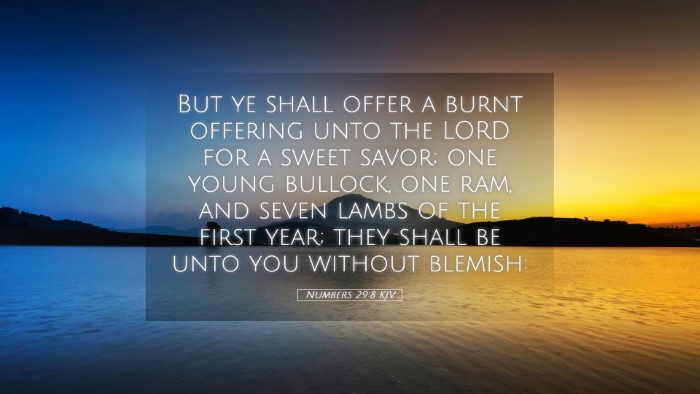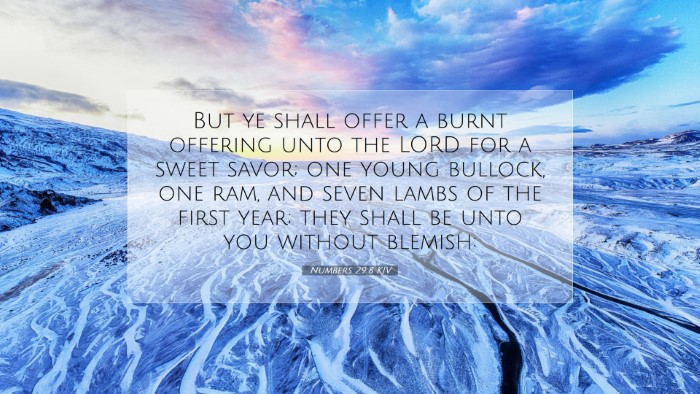Commentary on Numbers 29:8
Text of the Verse: "And ye shall offer a burnt offering unto the Lord, a sweet savour; one young bullock, one ram, and seven lambs of the first year; they shall be unto you without blemish."
Introduction
This verse forms part of the detailed instructions regarding the offerings to be made during the Feast of Tabernacles, as outlined in the Book of Numbers. The sacrificial system in Israel was profoundly symbolic, reflecting the relationship between God and His people, as well as the gravity of sin and the need for atonement.
Contextual Overview
Numbers 29 outlines the specific offerings for various feasts, including the New Moon and the Sabbaths, culminating in the instructions for the yearly celebration of the Feast of Tabernacles. This festival was one of the three great pilgrimage festivals in Judaism, alongside Passover and Pentecost. Here, God lays out a structure for His people to respond to His grace and provision with acts of worship.
Analysis of the Offering
1. The Nature of the Offering
The burn offerings prescribed consist of a young bullock, a ram, and seven lambs, emphasizing the importance of bringing offerings without blemish. According to Matthew Henry, this reflects the principle that the offerings made to God must be of the best quality, symbolizing the purity and perfection that God demands. The phrase "sweet savour" signifies that these offerings are pleasing to the Lord, which can be interpreted as an indication of the sacrificial system's purpose – to restore fellowship between humanity and the Divine.
2. The Symbolism of the Animals
Albert Barnes notes that the choice of animals represents various facets of atonement and dedication. The bullock is often associated with sin offerings (Leviticus 4:3-12), the ram may signify personal dedication and restitution, while the lambs symbolize innocence and mildness. Each of these animals collectively provides a comprehensive picture of the atoning work of Christ, who ultimately fulfills the sacrificial system.
3. The Emphasis on Unblemished Offerings
The stipulation for the offerings to be 'without blemish' serves as a critical reminder of the inherent sinfulness of humanity. According to Adam Clarke, this requirement points to the fact that sin cannot be appeased by flawed offerings. The necessity for unblemished sacrifices foreshadows the ultimate sacrifice of Jesus Christ, who, being without sin, becomes our perfect offering to God.
Theological Implications
This verse can be understood to carry significant theological weight. The burnt offering symbolizes total consecration and dedication to God, as the act involves the complete consumption of the offering by fire, leaving no part for the offerer (Leviticus 1:9). This act of offering exemplifies the idea of surrendering oneself entirely to the will of God. As Matthew Henry expounds, God desires our whole being and service, not merely our ceremonial acts.
1. A Reflection of Atonement
The offerings prescribed here serve as a foundational reflection of the concept of atonement in the broader Biblical narrative. Albert Barnes highlights that these rituals remind the people of their dependency upon God’s mercy and grace. The consistent practice of sacrifices ensued as a means to restore broken fellowship and highlight the seriousness of sin's consequences.
2. The Role of Joy in Worship
Additionally, the phrase "sweet savour" indicates that God delights in the worship of His people. This links to the joyous nature of the Feast of Tabernacles itself, reinforcing the idea that worship should be an expression of gratitude for God’s provision. Adam Clarke comments that this festive worship acts as a spiritual stimulus, encouraging the Israelites to recognize and celebrate God's faithfulness in their lives.
Historical Perspective
Historically, the importance of these offerings cannot be overstated. They served as a communal focal point for Israel, drawing the people together in national and spiritual identity. The sacrificial system created an awareness of both God’s holiness and the people’s continual need for repentance and restoration. The rituals were a sacred reminder of the covenant relationship that existed between Jehovah and Israel.
1. Feasts as Reminders of Identity
The Feast of Tabernacles, during which this offering was made, served as a reminder of God’s provision during the wilderness wanderings (Deuteronomy 16:14-15). As Matthew Henry points out, such acts are meant not only for appeasement but for the recognition of God’s ongoing work in one's life, thus fostering a deeper relationship with Him.
Practical Application
For pastors and spiritual leaders today, this verse offers rich insights for instructing congregations on the essence of worship and sacrifice. The emphasis on quality and unblemished offerings challenges modern believers to consider the state of their hearts and lives as they come before God.
1. Encouragement for Authentic Worship
Church leaders can encourage congregants to bring their best to God, not just in terms of material offerings, but also in service, love, and devotion. As Albert Barnes mentions, it is through such authentic engagement that worship becomes a “sweet savour” to the Lord, fostering an environment of genuine community and spiritual depth.
2. The Call to Dedication
The unblemished requirement of offerings parallels the New Testament call for believers to present their bodies as living sacrifices (Romans 12:1). Thereby, this scripture invites believers into a lifestyle of dedicated service, signifying their total commitment and surrender to God’s purpose in their lives, which can be essential during sermons or teaching sessions.
Conclusion
Ultimately, Numbers 29:8 serves as a poignant reminder of the seriousness of worship, atonement, and commitment to God. The historical context, theological implications, and practical applications of this verse allow pastors, students, theologians, and scholars to dive deep into the intricacies of God’s character and His expectations of His people. In remembering the nature of the offering, the call to authenticity, and the joyous recognition of God’s continual provision, readers are invited into a fuller understanding of what it means to be devoted followers of Christ.


